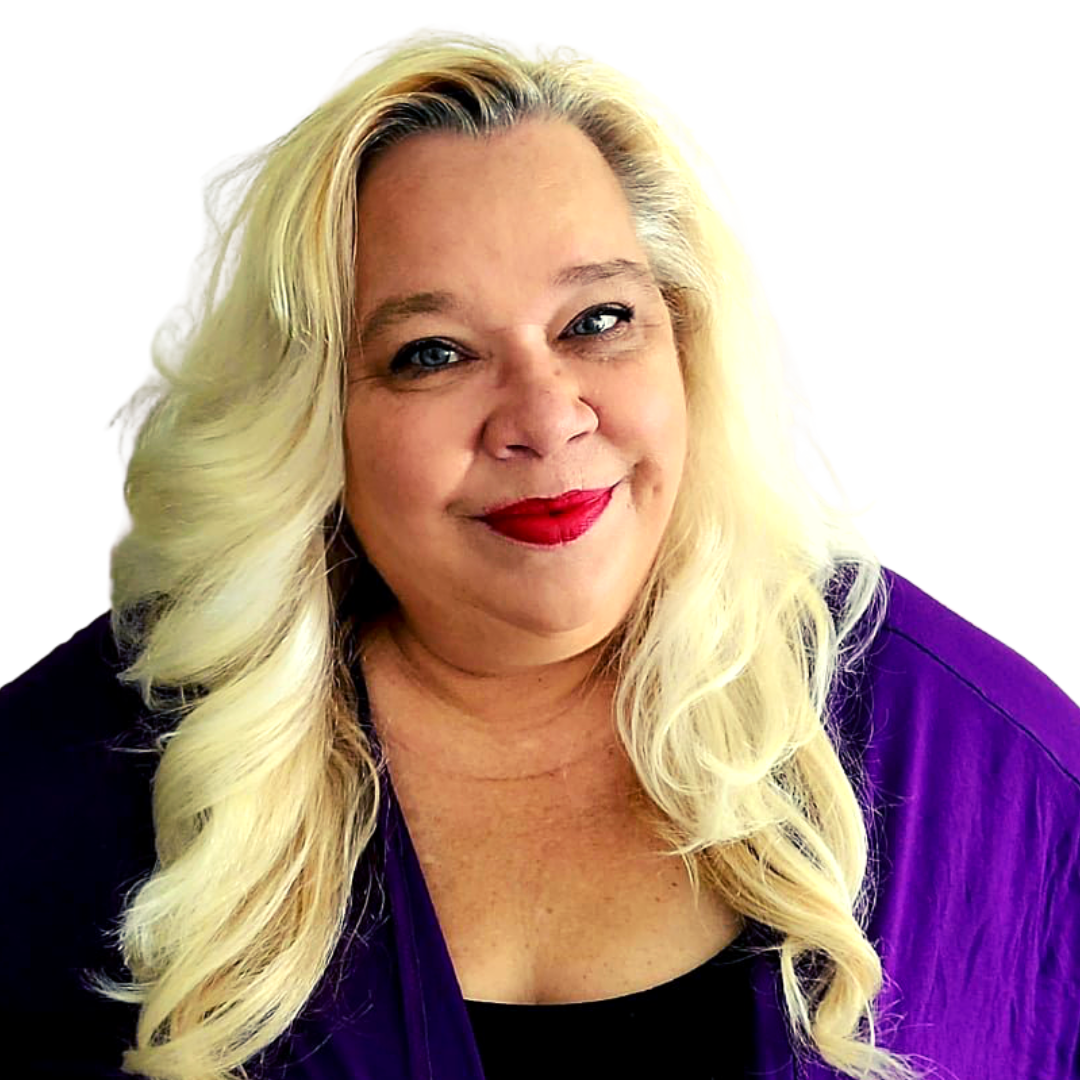Fibromyalgia, psoriasis, psoriatic arthritis, and endometriosis: “The best advice I can give is to practice patience!”
Published 24 Aug 2022 • By Berthe Nkok
Several years after experiencing her first symptoms, Cynthia was diagnosed with psoriasis, fibromyalgia, psoriatic arthritis, and endometriosis. Since then, she learned to live with each of her chronic illnesses knowing her body triggers allergic reactions to most pharmaceutical treatments.
A few years later, she started her blog, The Disabled Diva, to share her thoughts and experiences by providing support for everyday activities and tips for making life with pain less painful.
Discover her story below!

Hello Cynthia, thank you for agreeing to talk to Carenity.
First of all, could you tell us more about yourself?
Born in the midwestern state of Ohio, my family moved to the southwest a few months before my 12th birthday. I have lived in Arizona and Colorado and have called California home for the past 12 years.
I am married and a mother of two adult children who, believe it or not, turned out to be pretty awesome despite their mother being chronically ill. Disney has always been a part of my life, and before moving to California, Disneyland has been our family’s go-to vacation destination. Disneyland has played a huge role in my growth as a disabled person. Now that we live here, my husband and I spend our spare time in the theme park.
 Photo courtesy of Cynthia
Photo courtesy of Cynthia
You have several illnesses. Could you tell us which ones? When were you diagnosed with each of them? What were the first signs of each?
I have multiple diagnosed chronic illnesses. The first to be diagnosed was psoriasis, 21 years ago. It began with the smallest of rashes, but while tiny, it packed a mighty punch of itchiness and burning. The doctor immediately dismissed it and sent me home with instructions to wash the area with an over-the-counter shampoo. After a few applications, the rash covered my body from head to toe. When I returned to the doctor, he couldn’t believe what he saw. He ran to his office to grab a textbook and was giddy to see that my rash was psoriasis. Apparently, he had never seen psoriasis before.
Had the doctor who had diagnosed psoriasis been knowledgeable about psoriatic disease, I know I would have been diagnosed with psoriatic arthritis at the same time. I had all the symptoms. But having been told to go home, lose weight, and exercise for those symptoms in the past and never heard of psoriatic arthritis before, I didn’t think to mention them. Nor did the doctor, who should have. Instead, that diagnosis would arrive after moving to another state, two years later and three months after I was diagnosed with fibromyalgia. And this happened only because I wore opened-toed shoes to my first appointment with a rheumatologist for fibromyalgia pain my primary couldn’t control.
I was diagnosed with fibromyalgia when joint pain, muscle aches, and debilitating fatigue began severely interfering with my daily activities. While happy to have received an answer for what I was experiencing, it would be almost another decade before I learned to live with each of my chronic illnesses because of a fourth one, endometriosis, which was diagnosed six months after fibromyalgia and three months after psoriatic arthritis.
The worst and most debilitating chronic condition I have is endometriosis. I was experiencing sharp pain on my left side every other month that got the attention of my gynecologist and me.
Between endometriosis and ovarian cysts, my internal organs were under attack. In the past 18 years, I have had five endomtriosis-related surgeries within four years. One to remove cysts and what endo adhesions they could find, a hysterectomy, two surgeries to fix and address the errors made during the hysterectomy, and the final one to fix an error made during the fourth surgery. This condition's damage and internal scarring and the surgeries it required have created life-long issues that will cause indescribable pain for the rest of my life.
What is life like with fibromyalgia, psoriasis, psoriatic arthritis, and endometriosis? Do you receive comprehensive care or do you see several specialists? How do you feel about your current management? What are your treatments?
Life with fibromyalgia, psoriasis, psoriatic arthritis, and endometriosis is complicated. There is always pain of some sort from one or more of my conditions. Endometriosis is the most painful of the lot and the worst to endure. As for the others, I have found a reasonable amount of relief from natural and alternative forms of pain relievers. I experienced significant relief from a fibromyalgia treatment early on but unfortunately ended up being allergic to it and had to stop. Since then, the side effects of any other pharmaceutical treatment I tried were far worse than the pain and symptoms, which is why I chose a different route for care.
Because I refuse prescription treatments for fibromyalgia and psoriatic arthritis, physicians within my health medical organization (HMO) will not see me. They have made it clear that they are only there to write prescriptions, not to track my progress with either condition.
As for pain relief, I have never been able to rely on pharmaceutical options. My body will tolerate one or two doses of prescribed pain medication before triggering an allergic reaction. Moving to California was the best thing for pain relief. Before moving to a state with a legalized medical cannabis program, I would save my pain pills for days that I couldn’t handle the pain anymore and chase it with benadryl.
I have been treating my chronic pain and symptoms with cannabis since 2012. It provides relief that prescription medications could not. In addition, I do anywhere between 30-90 minutes of physical therapy daily. I also use infrared light therapy, ice/heat, and massage. Modifying activities that cause pain makes a huge difference. There is so much I would not be able to do if it weren’t for my mobility aids.
According to you or to the doctors, is there a link between your conditions?
This is a tricky question to answer. During the years I saw doctors for each condition, there were no conversations about the relationship between them because they were too busy trying to bully me into going back on a medication that caused a horrific seven-month withdrawal or trying to prove I did not have said condition (only to prove that I did).
On a daily basis, which condition requires the most follow-up or is the most disabling? Why?
Endometriosis is my most debilitating condition. My internal organs are constantly under attack between endo adhesions and scar tissue from surgeries. Adhesions cover my bowels, ribcage, bladder, and abdominal sidewalls. They tighten their hold, then pull and twist the organs until something rips. This has also caused significant muscle damage within my abdominal muscles and pelvic floor.
Do you have a family history of any of your conditions?
Surprisingly, yes! I say surprisingly because my relatives never discussed their health issues growing up. We knew what relatives died from, but not always what led to it or chronic issues. However, in the past decade, I have learned that several family members have psoriasis and endometriosis. But they only had one or the other and were either mild cases or easily treatable.
Do you feel supported by your family and friends? Do they understand your daily life with the disease?
I do now, but mostly from my husband and children. I attribute that to their living with me and seeing how my conditions affect me firsthand. The support from close friends and family has improved through the years.
What is the impact of your conditions on your private and professional life? What misconceptions do you frequently hear about your so-called "invisible" diseases?
This is a loaded question!! My chronic illnesses have made me unreliable. I cannot predict how I will feel next month, week, or even tomorrow. Plans must be made with a disclaimer stating that if my conditions cooperate, I will attend but don’t count on my attendance. As for my professional career, it was over soon after my first diagnosis. After fifteen years of working, my body would no longer allow it. My conditions do not allow me to follow a set schedule. I need to rest days before and after any special event. Brain fog and fatigue make it difficult to think or get dressed.
Shortly after, you decided to launch your blog “The Disabled Diva”. Why did you make this choice? What messages do you want to convey to your readers?
The first decade of my chronic illness life was about survival. I was getting diagnosed, addressing the most severe issues, and undergoing way too many surgeries in a short amount of time. It was after I entered the second decade of my chronic life that I began blogging.
The Disabled Diva began because Twitter did not provide enough space to get my thoughts out ten years ago! My blog gave me a place to share my thoughts and experiences. It later became a place to share product reviews and has helped me carve out a career in creating digital content. Thanks to social media and my blog, I can earn a living from my bed, which was a mission of mine after discovering that I did not qualify for disability.
The message I wish my readers to get when they visit my blog is that they are not alone. The story about my toenails leading to my psoriatic arthritis diagnosis has helped some of my readers receive their diagnosis! I share my whole story to expose healthcare's pitfalls and help others avoid them.
My blog provides support for everyday activities and tips for making life with pain less painful and easier to manage. Recently I have added chronic illness journal prompts to help readers think about and document feelings they may not have realized they are experiencing. Another new addition is word games to fight the effects of brain fog.
What are your plans for the future?
My plans for the future are to continue raising awareness and helping others with my blog and social media platforms.
Finally, what advice would you give to Carenity members who, like you, are affected themselves or have a loved one affected by one or many invisible chronic illnesses?
The best advice I can give is to practice patience! Whether you are the patient or not, it takes time to process the diagnosis, how to live with it, and what it means for the future.
Finding a medication or treatment that works best for you may take several or many attempts. Again, practice patience. Learning how to function in a body that doesn’t function properly requires patience. It is not a race. Be patient when your body flares. Give it the time it needs to rest and recover. Patience. Understand that your family will be waiting for your to heal, be patient as they get used to your new life.
You now have a chronic illness, a condition that has no cure. Family members must also be patient and understand that chronic diseases will forever change their and your lives.
Any last words?
Just know that you are not alone! I was diagnosed before social media and was not tech savvy enough to find chat rooms. But now, with social media and so many chronic illness sites and blogs, there is a plethora of support and resources. Finding support and developing friendships with others with the same or similar conditions can improve your chronic life experience.
Give it a "like" and share your thoughts and questions with the community in the comments below!
Take care!

 Facebook
Facebook Twitter
Twitter


